#HIJAZ
Explore tagged Tumblr posts
Text
Have you heard about Yathrib?
If you're looking for a bigger place, feel free to look up Medina I mean occupied Yathrib, which was home to 3 Jewish tribes until they were genocided and ethnically cleansed from the Hijaz area.
[non-muslims are still not allowed to enter that city, by the way
Have you heard about the genocide of Beni Qurayzah?
They were one of those three tribes.
They were put under siege, despite being uninvolved in the fight. When they surrendered, all man and boys (over puberty) were killed.
All women and children were forced to convert to Islam. Their homes and lands and belongings were taken for Muhamad and his people.
Musnad Ahmad ibn Hanbal no. 22823 also mentions that the Qurayza allegedly helped Muhammad by turning down Abu Sufyan when he wanted their help to attack Muhammad, and that Abu Sufyan was not happy with them.
Tabari (Muslim historian) and Ibn Hisham mention 600-900 of the Banu Qurayza were beheaded.
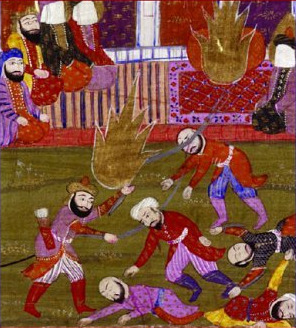
Detail from the miniature painting "The Prophet, Ali, and the Companions at the Massacre of the Prisoners of the Jewish Tribe of Beni Qurayzah", illustration of a 19th-century text by Muhammad Rafi Bazil.
#hijaz#medina#mecca#islam#yathrib#occupation#occupied Yathrib#Banu Qurayza#بنو قـريظة#بنو قينقاع#بنو نضير#hypocrisy#muslim#Banu Nadir#religions
9 notes
·
View notes
Video
Hedjaz Railway - HR 0-6-0T steam locomotive Nr. 5 (Krauss 4954 / 1903) by Historical Railway Images
#train#steam#locomotive#Hedjaz#Railway#Krauss#0-6-0#Eisenbahn#Hedschasbahn#Hijaz#קטר#קיטור#רכבת#חיג'אז#سكة حديد الحجاز#flickr#trainspam#historical
2 notes
·
View notes
Text
Forbidden Melodies to Get Lost In
This breakout artist, renowned for her captivating voice and unparalleled fusion of Middle Eastern influences with dark pop, invites you on an emotional odyssey through her most personal track yet. “Forbidden” uses the Hijaz scale, creating a dark and haunting atmosphere. The song features rhythms inspired by Middle Eastern traditions, adding a captivating feel. From the heart-wrenching vocals…

View On WordPress
#alternative pop#ANLIL#Emotional#Forbidden#Hijaz#Hijaz Scale#Logic Pro X#Melody#Middle Eastern#Music Theory#new music#Song Structure#Songwriting#toronto#Vocals
0 notes
Text
20 questions for: Habib Kassem (#15) Episode #15 of my series "9273 roots": 20 questions for the man who created a mobile app that can conjugate Arabic verbs flawlessly: Habib Kassem. https://arabic-for-nerds.com/interviews/9273-roots/20-questions-habib-kassem-15/?feed_id=5181&utm_source=Tumblr&utm_medium=geralddrissner&utm_campaign=FS%20Poster
#9273ROOTS#ANDROID#CONJUGATION#DATABASE#GOOGLEPLAY#GRAMMARBOOKS#HIJAZ#IMPERATIVE#LEBANESECIVILWAR#MOOD#MOUSTAPHAAKKAD#PASSIVE#PROVERB#SEMITICLANGUAGES#TAJWEED#THEHOUR#THEMESSAGE#WIEDERHOLEN#ألف#مجزوم#GERALDDRISSNER
0 notes
Text
I’m imagining a sick fight between Terry and Blight to this song and
✨💡✨
👁️🫦👁️
youtube
#batman beyond#blight#terry mcginnis#Youtube#No but this sounds so much like the OST it’s unreal#The pacing of it#Some of the little dissonant riffs I can picture Terry doing his handsprings off walls and shit#Actually with the Hijaz scale stuff going on that would suit Kobra pretty well too#If anyone does a live action Batman Beyond… they should let me do it instead#I want to but I shouldn’t because the original is literally perfect and don’t touch it#OH GOD THE LYRICS FIT SOMETHING ELSE TOO OGH NO
2 notes
·
View notes
Text
Recently I have found a period drama about Tariq ibn Ziyad and the conquest of the Iberian Peninsula, so I thought it's an appropiate to share it now because of the bookscans of AL-ANDALUS. Historical figures. This period drama is a Kuwaiti-Syrian series from 2022, Fath Al-Andalus (The Conquest of Al Andalus), that has 30 episodes so far.
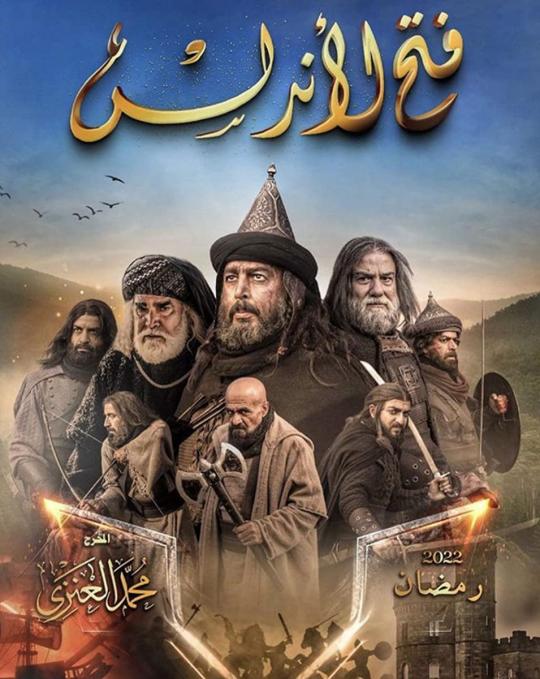
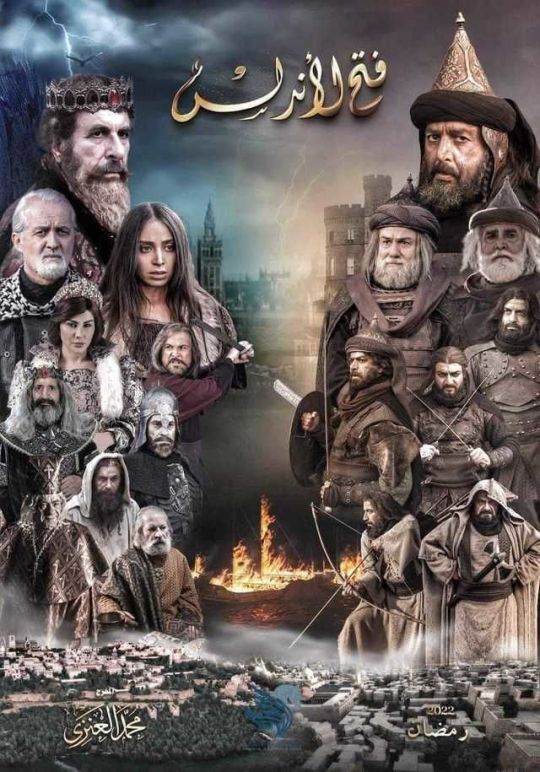
(There are ships on fire on the second poster, maybe in the series there's a scene or a reference about the legend of Tariq burning the ships after arriving to the Iberian Peninsula?)
I haven't watch it (yet), but in YouTube there's a watch list of the 30 episodes with subtitles.
As far as I know there has been controversies about this series in Morocco due to some historical inaccuracies, like erasing Tariq's Amazigh origins and undervalue the role of the Amazigh people in the conquest of Al Andalus.
Main cast
Suhail Jabei as Tariq ibn Ziyad
Taiseer Edris as Rodrigo, King of the Goths
Rafik Ali Ahmad as Musa ibn Nusayr
Pierre Dahger as Julián, Count of Ceuta
Marah Hijaz as Princess Florinda
Akef Najem as Abu Basir, the Judge
Creative and technical staff
Directors: Mohammad Alenezi and Saleh El Salty
Cinematography: Dragan Sisa
Editor: Mohamed Rageh
Visual effects: Momen Ebba and Eman Alshehabi
Productor: Al Buraq Production
Music: Nouamane Laholu

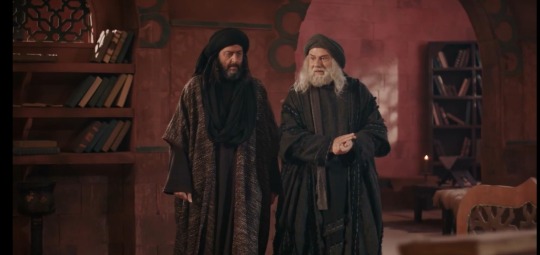

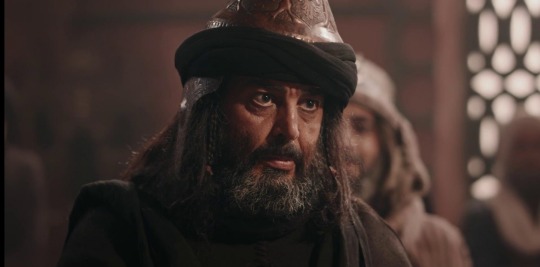


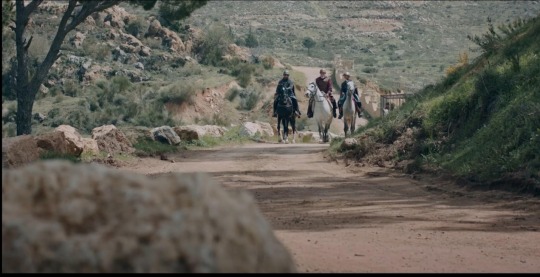

#fath al andalus#period dramas#the conquest of al andalus#series#tariq ibn ziyad#king rodrigo#musa ibn nusayr#conde don Julián#count don julián#julián de ceuta#rey rodrigo#florinda#princess florinda#abu basir#suhail jabei#taiseer edris#rafik ali ahmad#pierre dahger#marah hijaz#akef najem#al andalus#mohammad alenezi#dragan sisa#mohamed rageh#momen ebba#eman alshehabi#nouamane laholu#book scans related
4 notes
·
View notes
Text
oh i was not expecting arabic style singing from spain
this is FUCKING good holy shit
again... don't think much of the staging and the choreography is a bit lackluster but the song itself is a breath of fresh air
#does this count as maqam?#i know arabic maqam did come as far as spain but i don't know if there's a different word for it#or if it uses hijaz exactly#idk man i only took a day course i just think the vocal style is neat#i'd have to get the piano out to work out of it's even in phrygean i can't rly tell modes by ear#anyway. song good#esc judgeblog#eurovision
2 notes
·
View notes
Text
Hijaz Mountains
Photo: Al Souda Mountains in Western Saudi Arabia by Hyserb. The Hijaz Mountains, stretching along the western coast of Saudi Arabia, are a stunning natural wonder that captures the essence of Arabian beauty. This mountain range serves as a formidable backdrop to the region’s rich history and culture, making it a significant landmark in the Arabian Peninsula. With peaks rising dramatically from…
0 notes
Text
Haul Syekh Nawawi al-Bantani ke-131, Penyambung Pesan Ulama
SERANG – Haul Syekh Nawawi Al Bantani ke-131 di Pondok Pesantren An-Nawawi Tanara, Kecamatan Tanara, Kabupaten Serang, Jumat (3/5/2024) malam berlangsung hikmat. Wakil Presiden (Wapres) KH. Maruf Amin menyampaikan, Syekh Nawawi Al Bantani merupakan sosok yang memiliki peran sebagai transmiter atau penyambung pesan dari ulama sebelumnya kepada ulama berikutnya. “Dengan pemikirannya itu, Syekh…

View On WordPress
#Haul Syekh Abdul Qodir Al-Jailani Lebak#Haul Syekh Nawawi Al Bantani#ma&039;ruf amin#Nawawi Center#penyambung pesan ulama#Syekh Nawawi al-Bantani ke-131#Tokoh Banten#ulama al-hijaz#Ulama banten
0 notes
Text
Double Standards (light it up):
You know, in light of everything going on in Colombia U and Harvard, etc., I wonder -
They say harassing random people and murder and rape and the vandalism of (everything Jewish) is ok, bc it's "retaliation".
Continue this line of thoughts, does it mean I get Carte Blanche to burn a local mosque?
After all, my family had been oppressed for wayyy more than 75 years under the Yemeni occupation. We were exiled and had to flee for our lives. My grandma told me stories about their journey, the little she remembers. She nearly died.
(we think she had a brother who did)
Also, does it mean I'm allowed to go and beat up anyone wearing a cross?
I mean, my other grandma's cousins were murdered by Christians in Auschwitz-Birkenau (her grandad survived and came to live with them in Israel after the holocaust. But that's another story.)
*for the record - idk how your family things go, but I met most of this grandma's cousins and can name/give a detail about at least half of them. Also just last weekend we talked about her aunt that died as her refugee's ship broke halfway through the journey to Israel. I know this story and the ship name and the aunt and her kids since I was a kid. So yes, those memories are part of my life.)
And I guess people shouldn't be able to talk Spanish in public. After all, we all Know what They did in 1492.
But why going back so much?
There's exile of Jews from Iran in the 70s. But you'll never hear about it.
You'll never hear about the way we were kicked from Afghanistan and Lybia and Tunisia (where, btw, a mob burnt down an ancient synagogue this very year.)
No one's talking about how jews were kicked out of Egypt.
(this is how ppl sound. If that make you think "well, actually -"then, why isn't it never applied to us?)
#spain#retaliation#yeah right#double standards#goyim can reblog#so fucking tired of this#if i had a nickel#for every country we WEREN'T exiled from#I don't think I'd have 2 nickels#honestly#exiled#murdered#or oppressed any other way#like in the Hijaz - you can't Exile the Jews if Jews aren't allowed to live there in first place#you know#or the uk in the 1200s iirc#or USSR#can't exile jews if you don't allow judaism#ancient Egypt is sort of the counterpoint#but it's more like “oh no you can't let those slave go! they are mine!”#antisemism#antisemitism#antisemism all the way down#hi do you remember how western culture is literally based on the oppression of jews?#that were not allowed to own land and in some places were only allowed to qork with money#which means the local monarch could always point at them as “those who take the money”#and if there were financial issues#just exile/kill them and take away all their things#who cares about them greedy dirty jews anyway?#jumblr
5 notes
·
View notes
Text
Taking the Peace Train
The G20 Summit is not an event that often captures my attention. Yes, it’s a theoretical big deal—the twenty wealthiest and most powerful nations and international organizations meeting annually (or at least theoretically annually) to discuss issues relating to the global economy, the earth’s changing climate, international financial issues, and matters relating to the question of sustainable development. Lots of talking! But that’s all it generally feels like to me: lots of talking, not much action, rarely any reason to foresee real or positive change. Maybe it’s just me! (And, just to be precise, the G20 has twenty-one members now that they voted to admit the African Union at this year’s summit.)
But this year’s summit was different. For one thing, it was the first G20 held in India. For another, certain key players were missing: Vladimir Putin sent his Foreign Minister, Sergey Lavrov, and Xi Jinping sent Chinese premier Li Qiang in his stead. But what caught my attention this year had nothing to do with people in or not in attendance, but with an announcement by Indian Prime Minster Narendra Modai that President Biden and Saudi Crown Prince Mohammed bin Salman had agreed to join him in working to create a rail- and sea corridor that will pass through the United Arab Emirates, Saudi Arabia, Jordan and Israel to link Europe and India in a way that even a year or two ago would have seemed unimaginable. That caught my attention. It won’t come cheap: conservative estimates put the price tag at something like $20 billion. But this project has the potential truly to change the face of the Middle East and I couldn’t agree more with President Biden’s assessment of the project as, and I quote, “a real big deal.” That, it surely is. Will it be possible to take a train from Paris to Tel Aviv and then continue on to Abu Dhabi…and then take advantage of a dedicated ferry link to Mumbai? Now that would be a trip I’d take in a heartbeat!
There was a time when the Middle East, including Turkish Palestine, was linked by a vast network of railroad tracks. I think of that often when I imagine what could be in the future in the Middle East. But, of course, thinking of the future by remembering the past is so basic to the way Jews think of the world that that kind of fantasy comes almost naturally.
Abdul Hamid II, forgotten today by most in the West, was the last sultan of the soon-to-be-mostly-dismantled Ottoman Empire. He reigned from 1876 to 1909, and left behind a legacy so brutal that he was known in his own day as the Red Sultan (i.e., with reference to the amount of innocent blood his forces spilled). But he was also a railroad enthusiast and built the Hijaz Railroad, connecting Damascus, Haifa, Basra (today in southern Iraq), Lod, and Medina (in today’s Saudi Arabia). It cost a fortune to build—the final price was the equivalent of 15% of the budget of the entire empire—and was financed entirely by the Ottomans with contributions from Muslims around the world. The remainder, the Sultan made up himself with public funds. It took years to complete the project and then, finally, passenger service began in 1908.
Israel was then still part of the Ottoman Empire. World War I was years in the future. No one imagined then that a war of almost unimaginable barbarism was a mere six years away. But even fewer, if anyone at all, could have guessed that when the dust settled Israel would be wrested from the Ottomans and handed over to, of all nations, Great Britain. That actually did happen, of course. But I believe that prospect would have struck most, if not all, as unimaginable in 1908. And so, when the railroad began operating, it was to the Ottoman Empire what the Transcontinental Railroad was for the United States in 1869: a way to united a large nation of disparate states and regions by making travel reasonable, inexpensive, and easy between its far-flung states or provinces. By 1914, there were three weekly trains from Damascus to Medina and seven weekly trains ferrying people from Damascus to Haifa. (The trip from Damascus to Haifa took 11.5 hours. By way of comparison, it took 83.5 hours to travel from New York to San Francisco by rail in 1876.)
Not many people think about what life was like in Ottoman times these days. But, of course, the great efforts of the early Zionists was precisely to bring Jews to Turkish Palestine. When Joan and I got married in 1980, some of her great-uncles were still alive and I heard lots of stories from them about their aliyah in 1909 to what was then a moshavah outside of Petach Tikvah called Ein Ganim. They had a lot to tell, but the detail that stuck me then was Uncle Shimshon’s comment that they fully expected the Jewish State to be born on land wrested from the Ottoman Empire. And so these Yiddish-speaking Polish Jews took Hebrew lessons out of conviction, but they also took daily Turkish class so as to be able to deal with the government, the bank, the post office, the local police, etc. Shimshon himself worked as a trumpet player in the Turkish Police Orchestra in Jerusalem, a job that most Israelis today would find surprising even to know once existed at all, let alone was open to Jewish musicians. But it was!
The announcement of a new rail-and-sea link from Europe to India G20 got me to remember the old Hijaz Railroad. (Hijaz, by the way, is the name of the western part of Saudia Arabia where Mecca and Medina both are located.) And then I noted in the paper something even more surprising: that Hayim Katz, the Israeli Minister of Tourism, entered Saudi Arabia a few days ago to attend a U.N. Conference, thus becoming the first Israeli cabinet minister to travel in public to that nation…and that Naif al-Sudairi, the Saudi ambassador to the Palestinians, traveled through Israel to the West Bank to meet with officials of the Palestinian Authority. And that double-headed piece of unexpected news, combined with the endless speculation that I see all across the press and the internet that the Saudis may soon join the Abraham Accords, which decision would almost inevitably bring along other Muslim-majority countries as well, has filled me with an uncustomary sense of cautious optimism as this new year dawns.
What concessions Israel would be called upon to make as their part of the bargain, I have no idea. Where the Palestinians would fit into all of this, if they would part of it at all, I also have no idea. (On the other hand, I can assure you that that is precisely what Ambassador al-Sudairi is discussing with the Palestinian leadership this week.) But the announcement at the G20 that the world’s leaders can already imagine flying to Istanbul and then traveling easily through Israel, Jordan, and Saudia Arabia to India has truly caught my imagination. The Hijaz Railroad is probably gone for good—I don’t see the Syrians establishing a rail link between Damascus and Tel Aviv anytime soon. But the idea of taking the train from Haifa to Medina, or north to Beirut (which was also a public train line not that long ago) is thrilling.
So that’s my dream. A Middle East united not by political theory or by treaties, but by actual travel, by the interaction of people eager to live together and to prosper as neighbors and, even, as friends. To buy each other’s tchotchkes in the shuk. To attend each other’s universities. To learn each other’s language. Coincidentally, and while I was daydreaming about taking the train to Medina, one of our Shelter Rockers sent me a link to a blog published by the Times of Israel in which a Syrian woman named Rawan Osman wrote very movingly about her first encounters with Jewish people and with Israelis. (To read her piece, click here.) And her point was the same as mine: that the way barriers between peoples are broken down is not by politicians talking at each other, but by people actually meeting, drinking coffee in each other’s café’s, window-shopping on each other’s streets, etc. But most of all, connections are created through free, unfettered, affordable travel. And railroad travel could be the key to it all.
This last summer, Joan and I took the train for the first time from Jerusalem to Tel Aviv. It was a great experience for us: on time, clean, comfortable…and incredibly fast: we were in Tel Aviv less than 45 minutes after leaving Jerusalem. So that was great. Maybe next summer we’ll take the train to Amman. Or to Medina. A new year is dawning. Who knows what it might not bring?

1 note
·
View note
Text
Jordan Independence Day Amman
Jordanian Flag Independence Day – Edarabia May 25 is Jordan Independence Day, and the “most important event in the history of the country, marking its independence from the British government in 1946”. The 2023 celebration signifies 75 years since Jordan “officially gained full autonomy in 1948“. King Abdullah I bin Al-Hussein “Jordan’s independence took place during the reign of King Abdullah I…

View On WordPress
#Al Shareef Hussein Bin Ali – Emir of Mecca - King of the Hijaz - King of the Arabs#Arab League#Arab Revolt Against the Ottoman Empire#Autonomous Constitutional Monarchy#Council of the League of Nations#Emirate of Transjordan#Great Arab Revolt#Hashemite Army of the Great Arab Revolt#Hashemite Kingdom of Jordan#Hashemites#His Majesty King Abdullah I Emir of Transjordan 1921-1946#His Majesty King Abdullah II – King of the Hashemite Kingdom of Jordan 1999 to Present#His Majesty King Al Hussein – King of the Hashemite Kingdom of Jordan 1952-1999#His Majesty King Talal – King of the Hashemite Kingdom of Jordan 1951-1952#House of Hashem#Jordan 1946 Independence from the British Government#Jordan Houses – Senate - House of Representatives#Jordan Independence Day May 25#Jordan WWI Allies Britain and France#Jordanian Armed Forces#Khamaseen Winds#King Abdullah I bin Al-Hussein#King of the Hashemite Kingdom of Jordan 1946-1951#Ottoman Empire#Presentation of Colours Ceremony#Sharif Hussein of Mecca#The Emir#Transjordan#Transjordan Memorandum#United Nations
1 note
·
View note
Text
gendered antisemitism and when jewish violence is exceptionalized (is everyone except the jews allowed to be violent?):
elza niego, a turkish jewish woman, was murdered by an older turkish man for adamantly rejecting his advances. he stabbed her to death more than 8 times in 1927. he had stalked her for years and was enraged at her engagement to her jewish coworker. he had even tried to kidnap her with other accomplices. elza and her family complained to the police and as a result he also spent time in prison (only some months). he refused to stop asking elza's family for her hand in marriage and was rejected each time, making him more upset. after his release from prison, he stabbed elza to death and severely injured her sister who was present at the time and tried to protect her. he did this in broad daylight. she was 17 when he first approached her and he was in his 50s. elza died at the age of 18. her murderer was osman ratip, the son of ahmet ratip pasa, former ottoman governor of the hijaz.
her murder sparked an intense emotional reaction from the turkish jewish community and her funeral attracted hundreds of jews to the streets. the turkish press claimed jews had flocked to the streets, blocking traffic and yelling calls for justice. jewish public outrage was unacceptable, seditious, and ungrateful. the press reaction led to the arrest of nine jewish leaders and the curtailing of the jews’ right to free travel in turkey. niego’s murder was an early indicator of the new government’s determination to quash any public jewish expression.

the funeral march of elza.
now these accusations of jews being disruptive and "violent" are mostly BS. but it is always possible that a few were, indeed, violent and unruly. because 25,000 turned up for elza’s funeral, demanding justice for her. it is only logical that some of those 25,000 acted poorly. or maybe even more than just *some*. with post oct 7th logic, does that make the antisemitic campaign demonizing and punishing jews for flooding the streets in support of elza okay and justified? these accusations of violence were mostly false but the world truly fears jewish violence, exceptionalizing it as "the worse of all". i'm not saying we should just do whatever we want and be violent to get back at them but it is important to recognize that jewish violence is treated very differently than others.
the police protected osman, not allowing him the punishment of being lynched and instead sending him to a mental asylum.
the antisemitic press demanded that turkey break off all ties with the jews. anti-jewish demonstrations spread to izmir: jewish schools were closed down and jewish newspapers prevented from publishing. meanwhile the press demanded that the jews be expelled from turkey. hmm...sounds familiar?
a handful of jews (around 9 or 10) were arrested for bad behavior and some reports state they were also arrested for insulting turkishness.
while the trial for these jewish men was being orchestrated, elza’s murderer osman had been deemed criminally insane and remanded to an asylum instead of being convicted for murder and sent to prison.
limitations on travel were then imposed on turkish jews. jak pardo, an elderly jewish teacher, wrote a letter to his former student prime minister inonu during the trial, complaining of maltreatment of the jews, which led him to be arrested for contempt of court.
as the prosecutor complained in court about jews not speaking turkish enough in public life and being ungrateful, it was evident to all involved that this was a show trial regarding the jews’ national loyalty to turkey. the case did not hinge on the facts specific to the funeral of elza niego. looking for evidence of an organized anti-turkish contingent, the police investigated the chief rabbinate and other jewish communal institutions and interviewed prominent jewish businessmen and communal leaders like albert karaso and marko nahum. and the anti-jewish campaign that was sparked by elza’s funeral was not strictly local. in izmir, the local turkish press relentlessly published anti-jewish screeds, a young jew was arrested after brawling with a man who hassled him for speaking ladino (anti zionists mad at jews for speaking hebrew is the same energy lmfao), and local teachers organized a petition protesting against jews, including a call for taking down hebrew signage at the jewish hospital and rabbinate—which an anti-jewish mob promptly did.
immediately after the trial, notable works of jewish apologia were published by prominent jewish writers such as muhsin tekinalp (formerly moiz kohen) and avram galante.
the jewish memory of the elza niego affair, as the jewish turkish press called it, was focused on the proven innocence of jews against accusations of disloyalty, while turkish memory centered on the unfortunate death of a young beautiful girl, minimizing the surrounding politics and pretending like the antisemitism that ensued never existed.
#antisemitism#the jewish turkish community couldn't properly mourn because they immediately had to defend themselves and try to fight for their innocence#while the turkish press had the privilege of lamenting over elza's death to feel good about themselves and pat themselves on the back
375 notes
·
View notes
Text
Jewish Song of the Day #31: Avram Avinu
youtube
Comments:
Posting this song today because I can't get it out of my head, it's too catchy, I've been listening to it on repeat
Question for any Sephardi folks: is this a really "big" song in Sephardi nusach? Because when I went looking for Ladino songs, I kept finding version after version of this one song lol.
Here is another excellent version (although it uses an alternate name it's the same song as far as I can tell) and has an excellent explanation in the description:
youtube
Vocals & arrangement by Farya Faraji. This is a song from the Sephardi music repertoire; the Jewish community that was expelled from Iberia at the end of the Reconquista, and settled around the Mediterranean, developping diverse regional styles based on where they settled. This specific song is from Tangiers, Morocco, and was written by an anonymous author in 1890. Different songs using this text, or similar ones detailing the birth of Abraham have existed during the centuries, but this one in Maqam Hijaz is the most well known one. My arrangement pays homage to the Moroccan-Spanish background of the song by mixing a Moroccan string section, percussions and oud with a Spanish guitar chord progression similar to Flamenco’s.
Lyrics in Ladino: Kuando el rei Nimrod al kampo salia mirava en el sielo i en la estreyeria vido una lus santa en la juderia Ke avia de naser Avraham Avinu. Chorus: Avraham Avinu, Padre kerido Padre bendicho, lus de Israel. Luego a las komadres enkomendava Ke toda mujer ke prenyada kedara si paria un ijo, al punto la matara Ke avia de naser Avraham Avinu. La mujer de Terah kedo prenyada i de dia en dia el le preguntava (or demandava) "¿De ke teneix la kara tan demudada?" Eya ya savia el bien ke tenia.
En fin de mueve mezes parir keria iva caminando por kampos i vinyas, a su marido tal ni le descubria topo una meara, ayi lo pariria En akella ora el nasido avlava: "Anda vos, la mi madre, de la meara, yo ya topo kien m'alechara, Malah de sielo me acompanyara. Grande zekhut tiene el senyor Avraham, que por él conocemos el Dío de la verdad. Grande zekhut tiene el senyor parido, que afirma la mitsvá de Avraham Avinu.
English translation: When King Nimrod went out to the countryside He was looking at heaven and at the stars He saw a holy light in the Jewish quarter [A sign] that Abraham, our father, was about to be born. Chorus: Abraham our Father, beloved father, Blessed father, light of Israel. Then he told the midwives That every woman who was still pregnant If she gave birth to a male child at once he will be killed because Abraham our father was about to be born.
Terach's wife was pregnant and each day he would ask her "Why do you look so pale?" She already knew the blessing that she had. At the end of nine months she wanted to give birth, She walked through fields and vineyards She didn't tell her husband anything, She found a cave; there, she would give birth. At that time the newborn spoke: "Walk away from the cave, my mother I have already found someone who will take me away. An angel from heaven will accompany me Because I am a child of the blessed God."
After twenty days she went to visit him. She saw in front of her a young man leaping, Looking at the sky and (looking carefully/noticing everything), In order to know the God of Truth.
Great merit has honorable Abraham Because of him we recognize the true God. Great merit has the father of the newborn Who fulfills the commandment of Abraham our father (circumcision).
60 notes
·
View notes
Text
يا يوسف الزهراء، في كل نفس أتنفسه لك دعاء
هذا العالم ميت بغيابك سيدي
يافارس الحجاز تفضل علي بنظرة مني إليك
قبل ان يتوقف هذا القلب للأبد
دعني أعيش سيدي في ظل نورك
حيث العدل والأمان والسلام
سيدي ياصاحب الزمان
-علينه ترابي
O Yusuf al-Zahra, for your return I pray,
Ya Aba Saleh, without you, the world fades away.
Ya Faris al-Hijaz, come before my eyes close,
Before this heart beats its final repose.
Ya Mahdi, let me live in your blessed light,
Where peace and justice shine ever bright.
-Alina Turabi
8 notes
·
View notes
Text
Shoemaker on literacy, memory, oral tradition, and the Quran:
Studies of literacy in pre-Islamic Arabia have been severely overlooked in recent Quran scholarship; in fact, literacy in the 7th century Hijaz was "almost completely unknown" and "writing was hardly practiced at all in the time of Muhammad." "[T]here seems to be a widespread agreement among experts on the early history of the Arabic language 'that, before and immediately after the rise of Islam, Arab culture was in all important respects fundamentally oral.'" Ancient graffiti in the region seems to have been a bit like early runic writing in Scandinavia--not central to the culture, mostly decorative and incidental, and certainly not used for long, important texts. "There is, in effect, a lot of 'Kilroy was here' scattered across the Arabian desert." Indeed, most of these graffiti are personal names or private in nature--we're not talking monumental inscriptions here, we're talking bored herders scratching stuff onto rocks to pass the time.
Southern Arabia and the larger oases to the north had more in the way of literate elites (and thus things like monumental inscriptions), but these places were far from the central inland Hijaz. If someone in this region did want to become literate, they would probably have learned to read and write in Greek or Aramaic, which were useful and important linguae francae.
As in very early Christianity, writing occupied a controversial position vis a vis orality--oral tradition was primary for the production and transmission of culturally important things like religious texts, poetry, literary prose, genealogy, and history. The shift to a literate culture came only with the expansion of Muhammad's polity into a wealthy, multicultural empire rather than a tribal state. Indeed, much of the early Caliphate's administration used Greek and other languages--Arabic entered administration only slowly, since a lot of early bureaucrats were drawn from the Roman and Sasanian bureaucracy.
And like early Christianity, another reason not to feel any urgency to write down Muhammad's teachings was that early Muslims expected the end of the world to come very soon, maybe initially even before Muhammad's own death.
The dialect of the Quran is distinctive and unusual; it is very difficult to locate where this dialect might have originated. Ahmad Al-Jallad tentatively identifies an Old Hijazi dialect, but the evidence for this dialect (besides the Quran itself) is limited and mostly much more recent, and he assumes the Quran was produced in the Hijaz.
The Arabic of the Quran can probably be identified with the prestige dialect of Levantine Arabic in the Ummayad period, but the origin of that dialect, and what Arabic dialects were brought together there in that time, is hard to ascertain with certainty.
Shoemaker thinks the Quran started as short collections drawn from individual memories following the conquest and encounters with widespread literacy; these collections would have been considered open, and subject to influence from oral tradition. They were combined into increasingly larger collections, with additional traditions and revisions, emergin as something like divergent versions of the Quran (though still not fully static and closed). Finally, the traditions of these regional versions, with other written and oral traditions, were fashioned into their canonical form under Abd al-Malik, and this version was progressively enforced across the empire.
Shoemaker brings in memory science and the anthropology of oral cultures: memory is highly frangible and fallible. Even though it functions well for day to day tasks, it's important not to overlook how common misremembering and re-remembering alters information in both personal and collective memory when talking about a text that even Islamic tradition agrees was not written down within Muhammad's lifetime.
Most forgetting occurs shortly after an event in question; a small core of memories we develop about an event will persist for a significant time after. These findings have been corroborated both in the lab and in the circumstances of everyday life.
Memory is not primarily reproductive; literal recall is, in evolutionary terms, pretty unimportant, and brains omit needless detail. Remembering thus involves a lot of reconstruction more than it does reproduction; memories are storied piecewise in different parts of the brain, and are assembled on recall, with the gaps being filled in using similar memory fragments drawn from comparable experiences.
Note Bartlett's experiments using a short Native American folktale; when asked to recall this story, even after only fifteen minutes participants introduced major and minor changes. Subsequent recall didn't improve accuracy, though the basic structure of the memory developed pretty quickly in each individual. But this structure was not especially accurate, and significant details vanished or were replaced with new information. Most often this information was drawn from the subject's culture (in this case, Edwardian England), forming a memory that made more sense to them and had more relevance in their context. The overall style was quickly lost, and replaced by new formations, and there was a persistent tendency to abbreviate. After a few months, narrative recall consisted mostly of false memory reports, a finding verified by subsequent replications of his experiments.
Experiential and textual memory in particular degrades very rapidly; this degredation is much faster when information is transmitted from one person to another. Epithets change into their opposites, incidents and events are transposed, names and numbers rarely survive intact more than a few reproductions, opinions and conclusions are reversed, etc. Figures like Jesus or Muhammad will hardly be remembered accurately even by people who knew them.
The style of the Quran (e.g., prose, and often terse, elliptic, and occasionally downright nonsensical prose at that) does not lend itself to memorization; Shoemaker argues it is only possible for people to memorize the Quran now because it has become a written document they can consult in the process.
Eyewitness testimony is of course also notoriously unreliable, despite what apologists (in particular Christian apologists) have argued. Cf. Franz von Liszt's experiment in 1902, where a staged argument in a lecture escalates to one student pulling a gun on another--after revealing this event was scripted and staged, and asking different students to recall the details of the event at different intervals afterward, literally none of them got it right--the best reports, taken immediately, got things about one quarter correct. Even repeatedly imagining a scenario vividly enough can eventually lead to a false memory of it occurring (a phenomenon which may explain some alien abduction reports). People mistake post-even hearsay or visualization for firsthand knowledge, especially in the case of dramatic events.
What memory excels at is remembering broad strokes--we are adapted to retain the information which is most likely to be needed, i.e., the gist (or, more likely, the broad themes) of events and information, and not its exact form.
There's a long digression here about John Dean's testimony on the Watergate conspiracy--this may be the first book in early Islamic studies to have Richard Nixon in the index.
Even competitive memory champions train for short-term recall of large amounts of information; they, and other people with preternaturally good memories, are of course exceedingly rare. It's very unlikely that someone could remember, several decades after the fact, precisely (or even mostly) what was told to them by their friend whose brother's wife's cousin was really there. So even within the traditional account of the Quran's composition, it makes no sense to claim it is in fact the verbatim word of Muhammad.
As in the case of Solomon Shereshevski, when you do have preternaturally good recall even for (say) lists of nonsense syllables, the result is actually kind of debilitating--you have so many useless details to sort through, it makes it quite hard to function at an abstract level. And hyperthymesiacs, though they exhibit a high level of recall about their past, still often remember things incorrectly, at about the same rate as people with normal memories--they are no less susceptible to false or distorted memories.
Nevertheless most modern scholars treat the Quran as a verbatim transcript of Muhammad's words. This is exceedingly unlikely! Especially given that "group" or "collaborative" memory--memories as reconstructed by individuals working together--appears to be even less accurate than individual memory. You get better results having people try to recall events by themselves.
Since during the age of conquests the majority of converts were not closely preoccurpied with the interpretation of the Quran, it would have had to have been rediscovered and hermeneutically reinvented later; the memory of Muhammad's words were being shaped by the nature of the community he founded, as its members collective and individual needs continued to evolve along with the context of transmission.
Many people, both scholars and the general public, seem to believe that people in oral cultures have remarkable capacities for memory not possessed by those of written cultures. Study of oral cultures has shown this is demonstrably false; literacy in fact strengthens verbal and visual memory, while illiteracy impairs these abilities. People in literate cultures have better memories!
Oral transmission is not rote replication; it is a process of recomposition as the tradition is recreated very time it is transmitted. Oral cultures can effectively preserve the gist of events over time, but each time the details are reconstituted, and the tradition can radically diverge from its first repetition, with the stories of the past being reshaped to make them relevant to the present and present concerns.
The collective memory of Muhammad and the origins of Islam as preserved in the Sunni tradition would have forgotten many details as a matter of course, many others because they were no longer relevant to the later Sunni community, and they would have been reshaped in ways that made them particularly suited to the life and community of their contemporary circumstances, exemplifying and validating their religious beliefs--ones very different from those of Muhammad's earliest followers.
The early Muslim conquests put a comparatively small number of soldiers, scattered across a huge territory, in a wildly different cultural and social context, especially in close contact with different Christian and Jewish communities, esp. in the Levant, which rapidly became the cultural center of the new empire. Jews and Christians may have joined the new religious community in large numbers in this time also; their faith and identity would have continued to evolve in this period, as we would expect from comparative episodes in the history of other religions. By the time that Muhammad's teachings were formally inscribed, the memories of his few hundred initial companions would have been transmitted and dispersed to a large number of people in a totally different set of circumstances, with consequences for how those memories exactly were recalled.
Jack Goody, researcher on oral traditions: "It is rather in literate societies that verbatim memory flourishes. Partly because the existence of a fixed original makes it much easier; partly because of the elaboration of spatially oriented memory techniques; partly because of the school situation which has to encourage "decontextualized" memory tasks since it has removed learning from doing and has redefined the corpus of knowledge. Verbatim memorizing is the equivalent of exact copying, which is intrinsic to the transmission of scribal culture, indeed manuscript cultures generally."
Techniques like the ars memoriae belong to literate cultures and were invented by literate people; they are unknown in oral cultures. Oral and literate cultures in fact have a radically different idea of what it means for a text to be "the same"--in the former, word-for-word reproduction is not necessary. A poem can be "the same poem" even if every time it is performed it is largely unique.
Case of the Bagre, the sacred text of the LoDagaa people of Ghana, an extended religious poem used in a liturgical context. Variations in its recitation aren't just variations in wording; changes in recitation can be radical, and the last version is always the starting point. Nevertheless (as in other oral cultures) it is considered "the same," functionally identical with each recitation. These differences appeared even among different performances by the same reciter, or multiple times in the same ceremony. Even the most formulaic parts have great variability. Similar variability in oral texts in other oral cultures has been documented by other anthropologists, including for historical events.
Shoemaker notes that the tradition that the Vedas were transmitted without variation from the time of their composition remains an article of faith in some quarters of South Asian studies; this flies in the face of all available evidence. In fact we have no idea what the state of the Vedic texts was prior to the earliest manuscripts; they may have been written all along.
Collective memory is shaped by contemporary cultural imperatives--examples of Abe Lincoln, a white supremacist considered nothing special by his peers; Christopher Columbus, once revered; the last stand at Masada, considered a minor event of little importance to broader Jewish history until the founding of Israel.
There doesn't have to be any conspiracy or coordinated effort for false narratives about the past to take root.
The hard horizon of communicative memory is around eighty years; so historical consciousness basically only has two modes: the mythic past of collective memory, and the recent past less than eighty or so years ago.
Lack of a clear "generic" monotheism in the Hijaz around the time of Muhammad's birth means the expectations and memory of Muhammad would have been profoundly shaped by Christian and Jewish beliefs.
Early Islam, like early Christianity, wasn't old enough to have a clear distinction between historical/origins memory and recent/communicative memory.
"For most of the seventh century, then, Muhammad’s followers had a memory that was still immersed in the social and cultural milieux of the late ancient Near East, from which they had yet to clearly differentiate themselves. They eventually would do this in large part by developing a distinctive collective memory for their group, different from those inherited from Judaism and Christianity, a process that was no doubt delayed by their fervent belief that the world would soon come to an end, making such an endeavor rather pointless for a time. Only as the end continued to remain in abeyance, and the community’s living memory grew ever distant from the time of origins did they develop a collective memory of their own. Yet, as Islamic collective memory began to evolve, one imagines that it initially took different shapes within the various pockets of Believers that were scattered across their empire. The basic elements of this nascent collective memory were, as Halbwachs says of the early Christians, “still dispersed among a multitude of spatially separated small communities. These communities were neither astonished, anxious, nor scandalized that the beliefs of one community differed from those of another and that the community of today was not exactly the same as that of yesterday.” Thus, we should expect to find a significant degree of diversity in religious faith and memory among the different early communities of the Believers, scattered and outnumbered as they were among the Jews and Christians of their burgeoning empire. Only with ʿAbd al-Malik’s program of Arabization and Islamicization was a new, distinctively Islamic collective memory and identity concretized and established for this new religious community. It was a collective identity that was formed from the top down and imposed, at the expense of any other alternative collective memories, with the full power and backing of the imperial state."
The limits of oral tradition apply even more strongly to the hadith and biographies.
70 notes
·
View notes